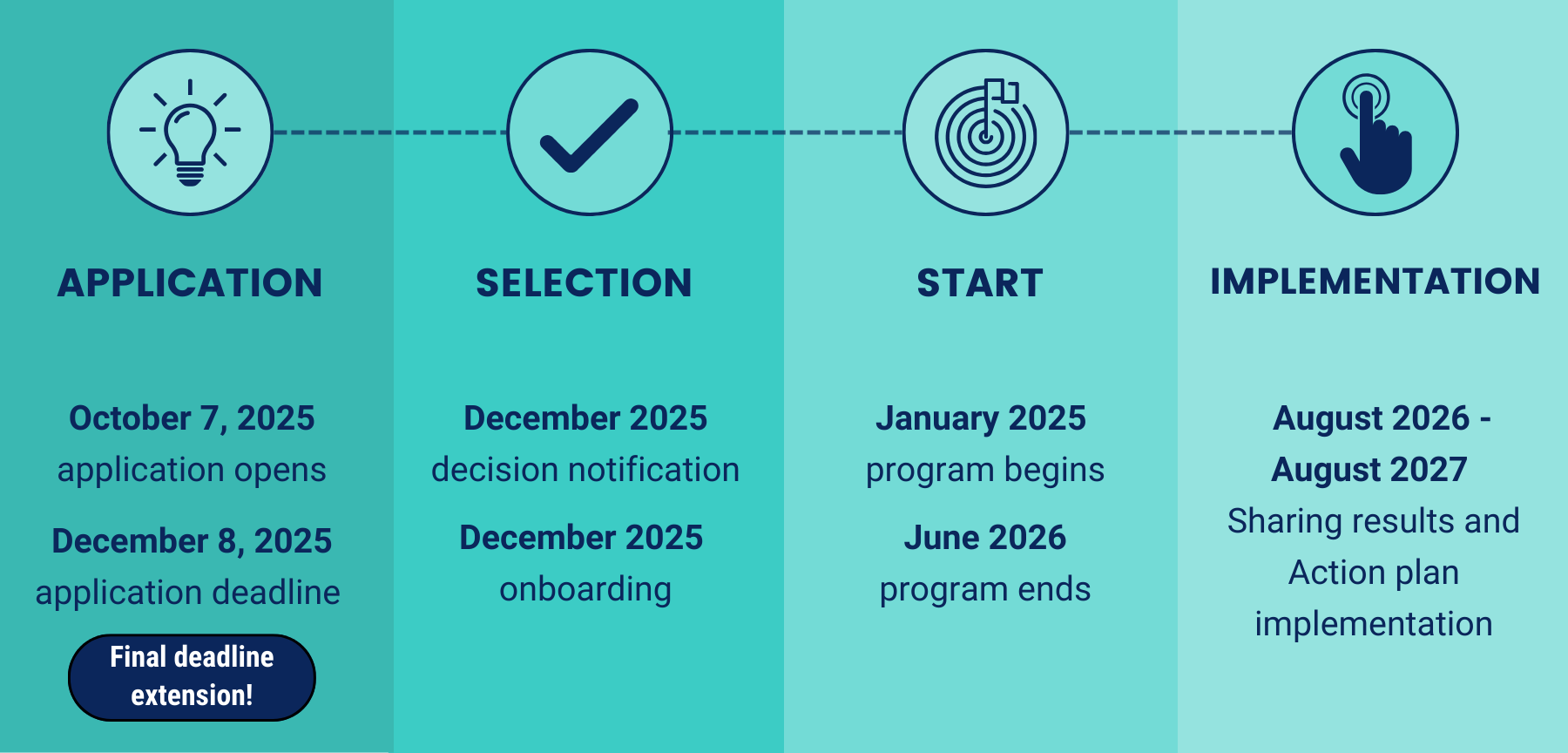At the crossroads of tradition and innovation, Europe's democratic landscape is experiencing a meaningful transformation. Innovative participatory and deliberative democracy models in Europe are still evolving and expanding unevenly, and some regions excel as changemakers while others face unique challenges.
To support the next generation of changemakers, People Powered and Coglobal are leading the Democratic Innovations Accelerator - Youth participation in policymaking and governance (DIA). The program is part of the Nets4Dem project and will select up to 40 participants to receive free capacity-building assistance for developing participatory programs that engage youth in policymaking and governance, whether in schools, local communities or local government, in the European Union (EU) and Horizon Europe countries (Albania, Armenia, Bosnia & Herzegovina, Faroe Islands, Georgia, Iceland, Israel, Kosovo, Moldova, Montenegro, North Macedonia, Norway, Serbia, Türkiye, Ukraine, and the United Kingdom).
Over the course of six months, a cohort of 40 civil society and government organizations will develop and deliver an action plan for implementing democratic innovations that enhance the engagement, participation, and influence of citizens — particularly youth — in democratic processes. Participants will have free access to:
A dedicated mentor to assist in the development of the action plan.
Step-by-step resources including the Participation Playbook, our interactive, online tool for designing participatory programs.
Practice-oriented live sessions and online courses.
International peer-learning opportunities.
Learn about current DIA participants
What is the application process?
Read through the program requirements and selection criteria below.
Complete the application form by December 8, 2025, 5:00 pm UTC (check your timezone here). Applications for this cycle have now closed.
Timeline:
October 7–December 8, 2025: Application period
December 2025: Selected participants are notified.
December 2025: Onboarding.
January 2026: Program begins.
June 2026: Program ends.
August–September 2026: Participants share learnings.
September 2026–August 2027: Participants implement their action plan.
Program timeline.
More application details
Staff members of civil society organizations or non-governmental institutions such as schools, universities or community organizations. Please note: We encourage partnership with a government institution to facilitate the implementation of the action plan.
Government officials, staff members and policymakers who want to launch or improve an innovative participatory program that actively engages youth in shaping decisions. Please note: We encourage partnership with a civil society organization/non-governmental organization to strengthen support for the program in the community.
Organizations should nominate a lead participant who has professional proficiency in English. To be eligible for the program, applicants must be based in one of the 27 EU Member States or Horizon Europe countries(Albania, Armenia, Bosnia & Herzegovina, Faroe Islands, Georgia, Iceland, Israel, Kosovo, Morocco, Moldova, Montenegro, New Zealand, North Macedonia, Norway, Serbia, Tunisia, Türkiye, Ukraine, and the United Kingdom).
Participants can expect to spend an average of two to three hours per week from January to June 2026 for the duration of the training program and mentoring support. If you are not sure about your availability for the program or if you are not selected this time, the DIA will accept new applications later in 2026.
Participants will also be asked to set aside a few key dates on their calendars to participate in the program’s live sessions.
After the completion of the training, participants will have 12 months to implement their action plan. The amount of time you spend on your project will depend on the action plan you have developed.
Develop an action plan (project) to be implemented, with the support of the program resources.
Engage internal and external stakeholders to develop the action plan.
Attend and participate in dedicated training and mentorship/peer support activities and discussions.
Report on project progress through surveys and learning reports.
Engage with other cohort members to support each other's work.
In no more than 200 words, please describe your proposal for an innovative participatory or deliberative project with youth.
In no more than 200 words, please describe the challenge you would like to address through the accelerator.
In no more than 250 words, how will your participatory or deliberative project be innovative in your context? How will you engage marginalized or excluded communities* in this work?
In 100 words, describe one key experience that demonstrates how you have worked in partnership to deliver an innovative participatory or deliberative program. If you haven’t had experience with this, please provide one example of a participatory program you have delivered and a partnership you have worked in successfully.
In 100 words, what will you try to accomplish by participating in the DIA program? Share how the program will support your organization to achieve your action plan goals. Please be as specific as possible.
Additional information: Is there anything else you wish to add?
Learn more about our DIA Mentors
Aleksandra Zietek: Eurocities, Belgium
Alisa Aliti Vlasic, Coglobal, Croatia
Andrés Falck: Coglobal, Spain
Anya Yemelyanova, Center for Innovations Development, Ukraine
Damir Kapidzic, University of Sarajevo
Domenico Di Siena: Demsoc, Italy
Emma Quaedvlieg: EPD, Belgium
Eva Bordos, DemNet Hungary
Johannes Jauhiainen, Demos Helsinki, Finland
Juan López-Aranguren: Demsoc, Spain
Jeremy Apert, EPD, Belgium
Reema Patel: ESRC Digital Good Network, UK
Seona Candy: Demos Helsinki, Finland
Pier Paolo Fanesi, Studio TIKE, Italy
Vincent Labrevois-Simonetti: EPD, Belgium
Partners
Funded in part by the European Union. Views and opinions expressed are however those of the author(s) only and do not necessarily reflect those of the European Union or EU Horizon. Neither the European Union nor the granting authority can be held responsible for them.










